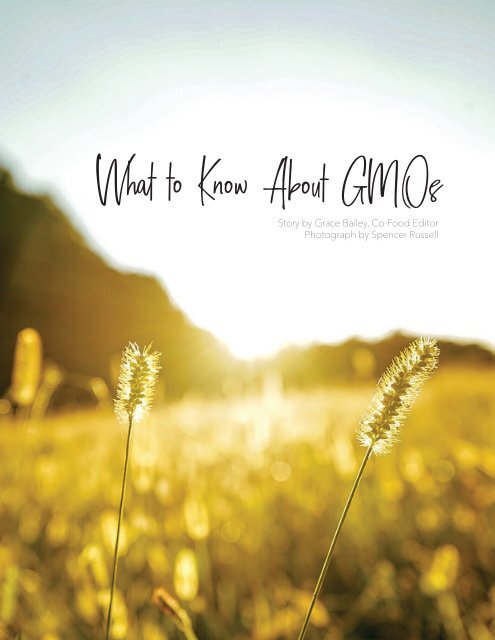You also want an ePaper? Increase the reach of your titles
YUMPU automatically turns print PDFs into web optimized ePapers that Google loves.
JUST A FAD?<br />
What to Know About GMOs<br />
Story by Grace Bailey, Co-Food Editor<br />
Photograph by Spencer Russell<br />
GMOs are genetically modified organisms. They have<br />
been modified with the DNA of a different species,<br />
and often with the DNA of a completely unrelated<br />
species. The genetically modified organisms or GMOs<br />
are the animals and plants that are genetically modified<br />
in order to develop the useful or desired traits.<br />
The techniques used to carry out genetic modification<br />
are known as genetic engineering techniques.<br />
John Graham, Reid Professor of Biology at Berry,<br />
goes into detail about his experience with GMOs and<br />
connects it to the research that has been done to illustrate<br />
that there are both pros and cons to the scientific<br />
endevour.<br />
Graham said: “I’m neutral on whether GMOs are<br />
dangerous or not, or whether they are harming our<br />
health. In general, there is nothing related to the technology<br />
that should be dangerous, though it would<br />
certainly be possible to create a dangerous GMO...<br />
There is much the public needs to know beyond what<br />
it hears from the two competing camps: the agricultural<br />
industry and the health food industry. If the<br />
public understood the technology they would be better<br />
able to judge the various claims about GMOs. In<br />
general, scientists are far less worried about GMOs if<br />
they understand the technology.”<br />
PROS<br />
- There is nothing related to the technology<br />
that should be dangerous<br />
- Non - GMO plants can be dangerous, Most<br />
plants synthesize a variety of carcinogenic and<br />
teratogenic chemicals to defend themselves<br />
against herbivores. Most agricultural varieties<br />
have had these chemicals bred out of them to<br />
some degree.<br />
- Some GMO foods have been modified to<br />
make them more resistant to insect pests. The<br />
University of California in San Diego reports<br />
that a toxic bacterium can be added to crops to<br />
make them insect repellent, yet safe for human<br />
use. This can reduce the amount of pesticide<br />
chemicals used on the plants, thus potentially<br />
reducing exposure to pesticides.<br />
- The FDA requires that GMO foods meet the<br />
same requirements as all other foods<br />
- If a GMO somehow reactivated the synthesis<br />
of these chemicals, that would be a<br />
problem<br />
- GMOs that involve having a plant synthesize<br />
an insecticide could be as problematic<br />
as spraying a plant with a pesticide. But that<br />
isn’t the technology’s fault.<br />
- Create an increase in food related allergies<br />
because the genetic engineering can trigger<br />
allergies from alternative foods.<br />
- Unpredictable<br />
CONS<br />
20 Food<br />
21














